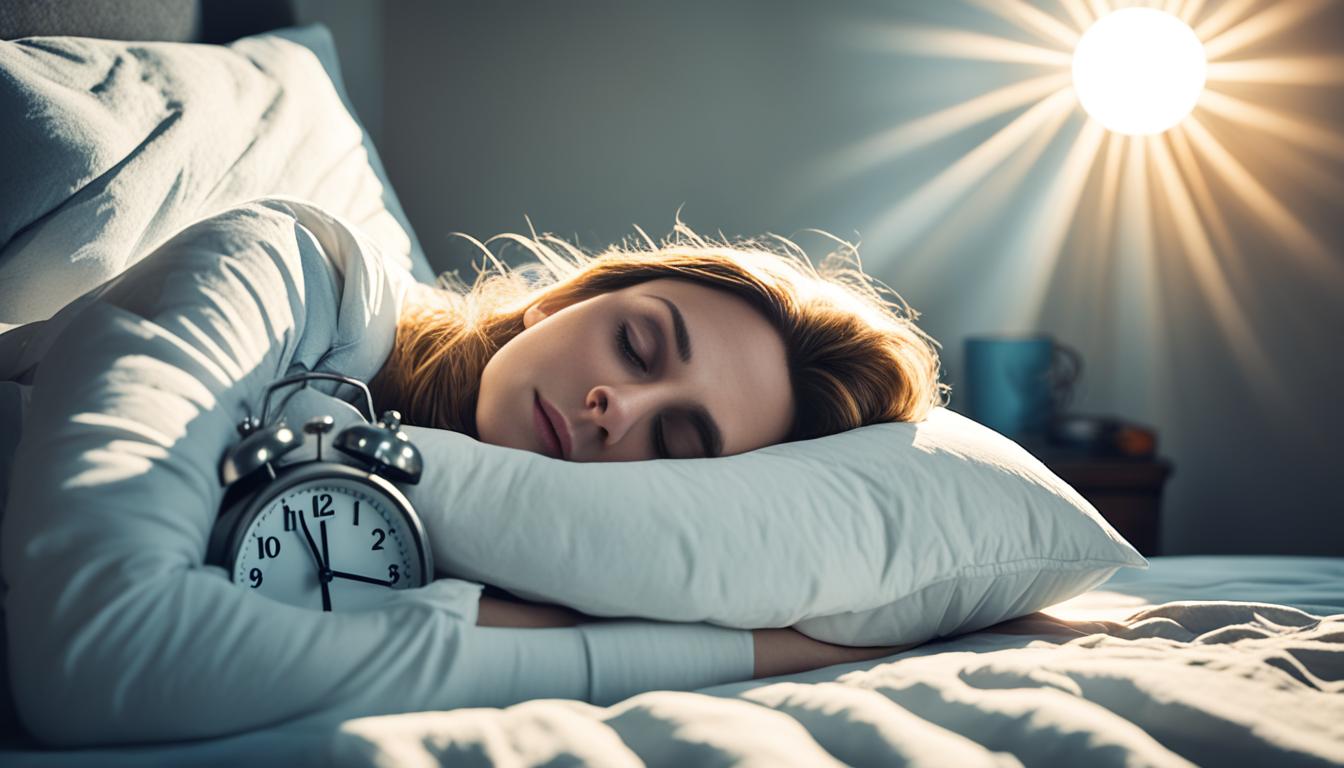Excessive daytime sleepiness is a big issue, and it affects 18% of people. It’s known as hypersomnia or excessive tiredness. It greatly affects how well people can do their everyday tasks and their general health. Knowing the signs, reasons, and how to treat this issue is key to solving it.
This sleepiness can come from many things, like sleep problems, brain conditions, or heart and lung issues. Conditions such as narcolepsy or sleep apnea mess up our normal sleep and wake schedule. This leads to feeling tired and sleepy during the day.
Things like being overweight, feeling down, being very old, or not sleeping enough can increase the chances of feeling too sleepy. Being overweight, for instance, is often linked with sleep apnea, where breathing stops and starts during sleep. This can make us feel even more tired during the day.
To find out why someone’s feeling so sleepy during the day, doctors look at their sleep habits, health, and history. They might do a sleep study to check on their brainwaves and oxygen levels while sleeping. Figuring out what’s causing the excessive sleepiness helps in choosing the right treatment.
Treating excessive daytime sleepiness focuses on fixing what’s causing it, and on getting better sleep. Changing how we live, like sticking to a sleep schedule, having good bedtime routines, and relaxing more, can really help. For those with serious sleep problems like sleep apnea or narcolepsy, doctors might suggest using a CPAP machine or taking certain medicines.
Key Takeaways:
- Excessive daytime sleepiness is common and ties to sleep disorders and health issues.
- Sleep apnea and narcolepsy are main reasons for being very sleepy during the day.
- Being obese, feeling down, age, or lack of sleep can lead to extreme sleepiness.
- To diagnose, extensive health checks and sleep studies are needed. These help find the reason behind the sleepiness.
- Treatments aim to fix the root causes and promote better and more sleep.
Obstructive Sleep Apnea and Excessive Daytime Sleepiness
Obstructive sleep apnea is often seen with too much daytime sleepiness. It’s a sleep problem where your upper airway gets blocked off during sleep. This leads to less oxygen, choppy sleep, and changes in how you sleep. OSA is all over the world, a lot of times found with being overweight.
People with OSA might not always feel how sleepy they are, shown by a test called the apnea-hypopnea index. But, feeling very tired during the day happens a lot with this condition. It messes up your daily life and how well you function.
The top way to treat OSA is with CPAP. You wear a mask that’s hooked up to a machine. The machine pushes air into your throat to keep it open while you sleep. CPAP stops your breathing from stopping at night and helps with being too sleepy during the day.
Benefits of CPAP Therapy for Excessive Daytime Sleepiness
CPAP makes a big difference in how tired you are during the day if you have OSA. It gets rid of pauses in your breathing and stops you from waking up a lot at night. This lets you have a normal night of sleep and wakes you up less tired.
Some of the things CPAP treatment is great for include:
- Feeling less sleepy during the day
- Doing better in thinking and paying attention
- Being in a better mood and feeling good overall
- Less likely to have accidents because you’re really tired
- Lower chance of getting other health issues from sleep apnea
If you’re super tired during the day and think you might have sleep apnea, getting checked out is a good idea. Using CPAP or other treatments can really help. This way, you can sleep and feel better every day.
Neurological Disorders and Excessive Daytime Sleepiness
Excessive daytime sleepiness often shows up in people with neurological disorders. Those with Parkinson’s might feel very tired during the day and might fall asleep suddenly. This sleepiness can make it hard to do daily tasks and lowers the quality of life.
Narcolepsy is another disorder that makes people extremely sleepy during the day. It also causes cataplexy, a condition where you lose muscle control when feeling strong emotions. Narcolepsy happens when the body doesn’t make enough hypocretin, which is a chemical that helps us stay awake and sleep well. Because of this, sleep and wake times get mixed up, leading to too much sleepiness.
Multiple system atrophy and other neurodegenerative disorders can also cause a lot of daytime sleepiness. These issues mess up the body’s natural sleep cycles. They lead to poor sleep at night and tiredness during the day. Managing these conditions involves improving sleep habits and treating specific symptoms that influence sleep and waking up during the day.
Today, treatments for daytime sleepiness focus on easing symptoms. But researchers are looking into a new possibility: stem cell therapy. This approach aims to fix the brain pathways that control sleep. If successful, it could become a key way to treat sleep problems linked to neurological conditions. Still, more studies are necessary to know if this therapy is both safe and effective.

